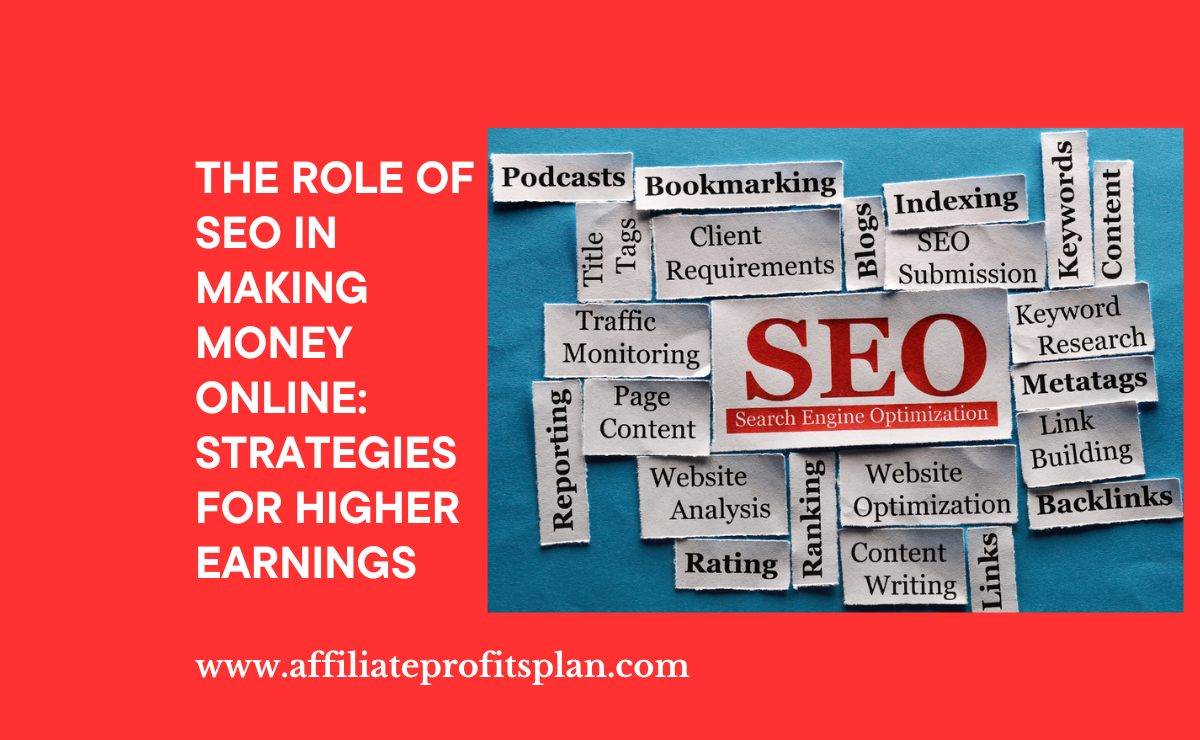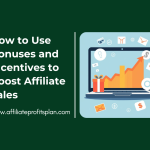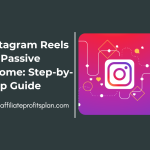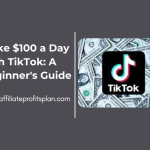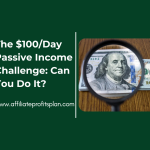Welcome to my article “The Role of SEO in Making Money Online: Strategies for Higher Earnings.” In the bustling world of the internet, where every click can lead to cash, one acronym reigns supreme: SEO. Short for Search Engine Optimization, it’s not just a buzzword for tech nerds—it’s the secret sauce behind virtually every successful online venture. Whether you’re running a blog, selling quirky cat mugs, or trying to become the next affiliate marketing sensation, SEO is your ticket to turning “just browsing” into “just bought.” Without it, your online efforts are like a café in the middle of the desert—great menu, but no customers.
So, what makes SEO so magical? Well, imagine having a personal assistant (in this case, search engines like Google) that brings the right people to your virtual doorstep—people who are actively searching for what you’re offering. The catch? This assistant is picky. You’ve got to impress it with the right keywords, a slick website, and enough credibility to show you’re the real deal. But when done right, the payoff can be huge: higher traffic, better conversions, and more earnings—without constantly shelling out cash for ads.
In this article, we’ll dive into the role SEO plays in making money online and, more importantly, how you can harness its power to boost your earnings. From nailing on-page SEO to mastering link-building strategies, you’ll learn actionable tips with a dash of humor to keep things entertaining. After all, making money online shouldn’t just be lucrative—it should be fun too. Ready to turn your website into a money magnet? Let’s get optimizing!
Access Our Proven Tested Formula for $50-$100 Daily Income – Watch This FREE Video >>
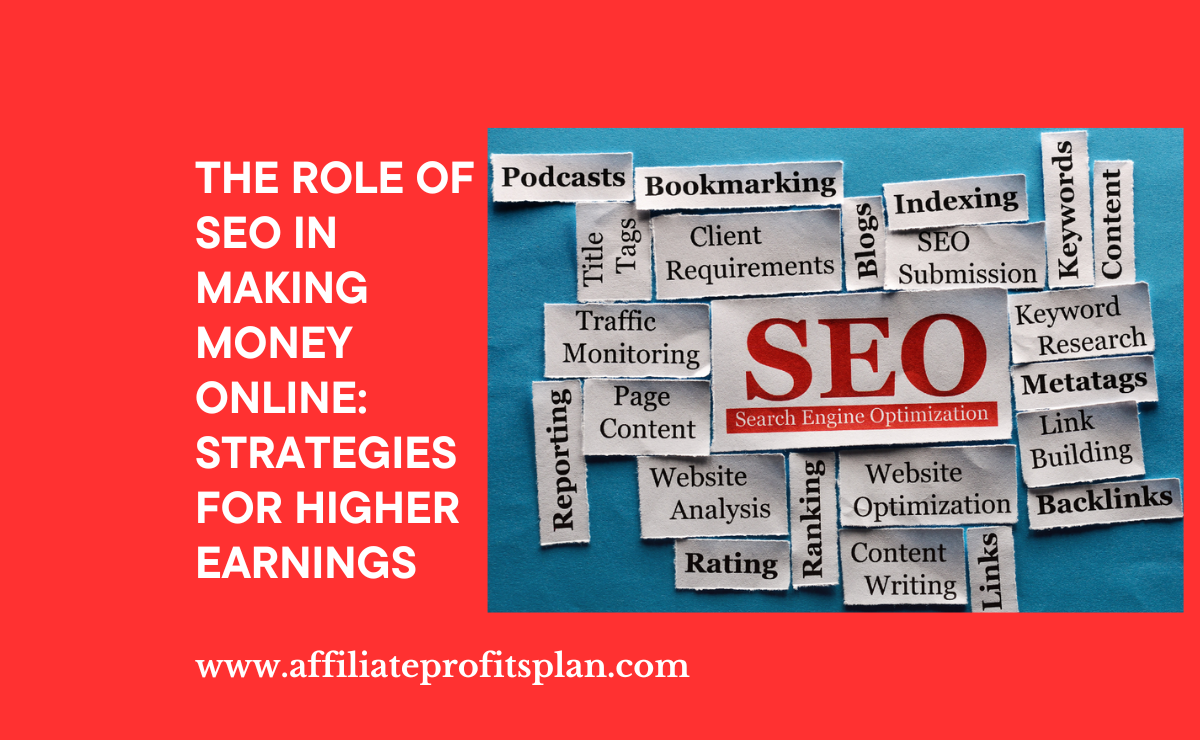
Why SEO is Crucial for Making Money Online
If the internet were a party, SEO would be the charming host making sure the right guests (your audience) show up and mingle with the star of the night (your website). Without it, you’re essentially playing hide-and-seek with your potential customers—and spoiler alert, they’re not great at seeking. SEO ensures your website doesn’t just exist in the vast expanse of the internet but thrives as a beacon that attracts organic traffic, builds trust, and ultimately converts visitors into loyal customers (or at least enthusiastic buyers).
Why is this so important? Let’s talk numbers. Studies show that 68% of online experiences begin with a search engine, and the top three results on Google gobble up a staggering 75% of clicks. Translation: if you’re not optimizing for search engines, you’re leaving money on the table—and not just a little. SEO is like prime real estate in the digital world, and ranking high is equivalent to opening a store on the busiest street in town.
Now, some might argue, “Why bother with SEO when I can just pay for ads?” Good question, hypothetical reader! The answer: sustainability and cost-effectiveness. While paid ads can drive immediate traffic, they’re like renting a flashy billboard—expensive and short-lived. SEO, on the other hand, is a long-term investment. Once your site starts ranking well, it can bring in steady traffic without draining your wallet. Think of it as planting a money tree: it takes time to grow, but when it does, it keeps producing—rain or shine.
And let’s not forget trust. Users tend to trust organic results more than ads. A high-ranking page signals to visitors that you’re credible and worth their attention (even if your site sells rubber duck collections). In short, SEO isn’t just a tool—it’s the backbone of making money online. Master it, and you’ll not only attract more visitors but also turn them into lifelong customers. Who wouldn’t want that?
Building a Strong Foundation: On-Page SEO Essentials
If SEO is the key to making money online, on-page SEO is the sturdy foundation your entire digital empire is built on. Think of it like constructing a house: no one cares about the fancy decor (like backlinks or social signals) if the walls are cracked and the floors are uneven. On-page SEO is all about getting your website’s structure, content, and user experience just right so both search engines and humans can fall in love with it.
Let’s start with the superstar of on-page SEO: keywords. These magical little words and phrases are what connect your content with people searching for it. But here’s the catch—it’s not about stuffing your page with every synonym of “best shoes” you can think of. (Yes, Google is too smart for that now.) Instead, focus on strategic keyword placement in titles, meta descriptions, headers, and content. Think of your keywords like sprinkles on a cupcake: enough to grab attention but not so much that it ruins the flavor.
Speaking of grabbing attention, your title tags and meta descriptions are like your website’s pick-up lines—they’re your first chance to charm search engines and users. A compelling title and description packed with relevant keywords can make all the difference between a click and a scroll-past. Pro tip: Keep them concise, punchy, and under Google’s character limit unless you want your masterpiece cut off mid-sentence.
Now, let’s talk about the unsung heroes of on-page SEO: user experience and site structure. A fast-loading, mobile-friendly website isn’t just nice to have—it’s essential. Slow pages and clunky navigation are like putting a “Closed” sign on your virtual store. Plus, Google loves sites that are easy to crawl and understand, so make sure your headings (H1, H2, H3) are logically structured. Think of them as breadcrumbs leading users (and search bots) through your content.
Finally, content is king—but not just any content. Your visitors (and Google) want something valuable, engaging, and fresh. Write for humans first, sprinkle in your keywords, and don’t be afraid to inject some personality (like we’re doing here). When your on-page SEO is solid, you’re not just improving your rankings; you’re building trust and keeping visitors coming back for more. And trust us, happy visitors equal happy earnings.
Off-Page SEO Strategies to Boost Earnings
If on-page SEO is your well-decorated home, off-page SEO is your PR team, spreading the word about how amazing your place is and convincing everyone to stop by. Off-page SEO is all about building credibility, authority, and trust for your website—because let’s face it, even the most beautifully optimized site won’t make money if no one knows it exists. So, how do you get search engines and users to see you as the superstar of your niche? Enter off-page SEO.
Access Our Proven Tested Formula for $50-$100 Daily Income – Watch This FREE Video >>
First on the agenda: backlinks. These are like endorsements from other websites, telling Google, “Hey, this site knows its stuff!” But not all backlinks are created equal. Quality matters way more than quantity. A link from a respected site in your industry is worth a hundred spammy ones from sketchy directories. So, how do you score these golden backlinks? Through strategies like guest blogging, where you write value-packed content for another site and sneak in a link to your own. Or try outreach campaigns, politely (and persuasively) asking other website owners to link to your content—no groveling required.
Next, let’s talk about social signals. While Google hasn’t officially admitted that social media activity directly impacts rankings, there’s no denying the power of a viral post. Shares, likes, and comments can amplify your content’s reach and drive more traffic to your site. The trick? Be active on the platforms your audience loves and create shareable content that’s informative, entertaining, or both. And hey, don’t forget to add those handy share buttons to your blog posts—it’s like giving your readers a nudge to spread love.
Another off-page gem is brand mentions, even without a hyperlink. When people talk about your site or business online, search engines notice. So, focus on building your reputation through consistent branding, stellar customer service, and engaging with your audience wherever they are—forums, social media, or even the comments section of a blog. Yes, being helpful in a Reddit thread could help your SEO (and your earnings).
Finally, don’t underestimate the power of online reviews and ratings. Positive reviews on platforms like Google My Business or Trustpilot not only boost your credibility but also improve your local search rankings. Plus, they make your business look trustworthy to potential customers. Pro tip: Kindly ask satisfied customers to leave reviews—and make it easy for them by providing direct links.
In the world of off-page SEO, it’s all about networking and reputation-building. The more other websites, users, and platforms vouch for you, the more Google trusts you—and trust equals rankings, traffic, and, most importantly, earnings. So, get out there, make some connections, and let the world (and Google) know your site is the place to be!
Leveraging SEO for Passive Income Streams
Ah, passive income—the holy grail of making money online. It’s that magical setup where you wake up to “You’ve made a sale!” emails, sip your morning coffee, and wonder why everyone isn’t doing this. But here’s the thing: passive income isn’t truly passive until you put in some upfront work. And when it comes to creating a steady stream of earnings, SEO is your best friend. Done right, it ensures your content works for you 24/7, pulling in traffic (and cash) even while you binge-watch your favorite series.
One of the most popular passive income models is affiliate marketing, and SEO is the lifeblood of any successful affiliate site. Imagine this: you write an epic blog post titled “The Top 10 Wireless Headphones for 2025” loaded with well-researched product recommendations and affiliate links. Thanks to smart SEO practices—targeting keywords like “best wireless headphones” and optimizing for search intent—that post ranks high on Google. Result? People searching for reviews find your article, click your links, and you earn commissions with every purchase. It’s like running a digital salesperson that never takes a coffee break.
Then there’s eCommerce and dropshipping, another favorite for passive income seekers. Here’s the trick: instead of competing with giant retailers, use SEO to carve out a niche. Let’s say you’re selling eco-friendly pet products. Targeting specific, long-tail keywords like “biodegradable cat litter in the USA” can help you rank for highly relevant searches. Once your site gains visibility, customers start rolling in without you needing to spend big bucks on ads. The best part? SEO-optimized product pages can keep generating sales for years with minimal updates.
Don’t forget about content creation platforms like YouTube or blogs monetized with ads. SEO plays a huge role here too. On YouTube, optimizing your video titles, descriptions, and tags with keywords can make your content discoverable to the right audience. The more views you rack up, the more ad revenue you earn—passively. For blogs, well-placed display ads and high-traffic posts can lead to consistent income. Bonus: tools like Google AdSense can turn even a moderately popular blog into a steady earner.
Another underrated way to leverage SEO for passive income is by creating digital products like eBooks, online courses, or printable templates. By optimizing your website or landing pages for search, you can attract buyers who are actively looking for solutions your product provides. A well-ranked page selling a niche course like “How to Start a Minimalist Lifestyle” can bring in passive income for months—or even years—once it’s up and running.
The beauty of combining SEO and passive income is that once you’ve done the groundwork—targeting the right keywords, creating optimized content, and building backlinks—your efforts keep paying off. Sure, you might need occasional tweaks to keep up with trends or algorithm changes, but the payoff is worth it. With SEO in your corner, making money online becomes less about constant hustle and more about smart, sustainable growth. So, sit back, relax, and let your optimized content do the heavy lifting.
Monitoring and Adapting: Long-Term SEO Strategies for Sustained Earnings
If SEO were a video game, ranking on Google would be like beating the boss level—it feels amazing, but the game doesn’t end there. SEO is a dynamic, ever-evolving landscape, and what works today might not work tomorrow. Staying at the top requires vigilance, flexibility, and a willingness to adapt. Think of it as tending a garden: even after your flowers bloom, you’ve got to water, prune, and keep those pesky weeds (read: algorithm updates) at bay.
First up: tracking your performance. You can’t improve what you don’t measure, so tools like Google Analytics, Search Console, and third-party SEO platforms (think Ahrefs or SEMrush) should be your best friends. Monitor key metrics like organic traffic, click-through rates (CTR), and keyword rankings. If you see a sudden drop in traffic, it’s not the time to panic—it’s the time to investigate. Is it a seasonal trend? A competitor stepping up their game? Or did Google roll out an update that turned your carefully crafted content into yesterday’s news?
Speaking of updates, let’s talk about those infamous Google algorithm changes. They’re like pop quizzes for your website—often unexpected and sometimes brutal. Staying informed about these changes is crucial for long-term success. Follow SEO news outlets, subscribe to industry blogs, and keep an eye on trends. When updates hit, analyze their impact and adjust your strategy accordingly. Maybe it’s time to focus more on user experience or double down on high-quality content. Flexibility is your superpower here.
And then there’s the golden rule of SEO: content is never truly done. Even your best-performing pages will eventually need a refresh to stay relevant. Update outdated statistics, add new insights, and optimize for emerging keywords. Think of it as giving your content a facelift—it keeps it fresh, engaging, and competitive. And let’s not forget internal linking! Regularly audit your site to ensure your pages are interconnected in ways that guide users (and search bots) effortlessly through your content.
Don’t overlook the value of user feedback either. What are people searching for on your site? Which pages are they bouncing off of? Use this data to improve your content and provide exactly what your audience needs. Happy users stick around longer, engage more, and are far more likely to convert—whether that means buying your product, clicking an affiliate link, or signing up for your email list.
Finally, remember that SEO is a marathon, not a sprint. The strategies that sustain earnings are those that evolve with the times. Keep experimenting, stay patient, and always be ready to pivot. Because when it comes to long-term SEO success, adaptability isn’t just a nice-to-have—it’s the key to keeping the cash flowing.
Conclusion
If there’s one thing you’ve learned by now, it’s that SEO isn’t just a fancy acronym—it’s the engine powering your online money-making dreams. From optimizing your website’s foundation with on-page SEO to building credibility with off-page strategies and leveraging search rankings for passive income, SEO plays a starring role in turning clicks into cash. But, as with all great things, it requires commitment, creativity, and a dash of patience (and maybe a coffee or two while you wait for those rankings to climb).
Access Our Proven Tested Formula for $50-$100 Daily Income – Watch This FREE Video >>
The beauty of SEO is that it’s a gift that keeps on giving. Sure, it takes upfront effort—fine-tuning your keywords, crafting irresistible content, and staying on top of Google’s whims—but once you’re in the game, the rewards can be both steady and scalable. Whether you’re running an affiliate blog, selling digital products, or driving traffic to your YouTube channel, SEO ensures your efforts are amplified, your visibility is maximized, and your earnings keep rolling in.
And here’s the best part: you don’t need to be an SEO wizard to get started. Begin with the basics, keep learning as you go, and don’t shy away from experimenting. The online world is full of opportunities for those willing to put in the work, and SEO is your ultimate partner in seizing them.
So, go ahead—dive into your analytics, brainstorm those high-performing keywords, and start building the kind of online presence that gets noticed, trusted, and paid. Because when it comes to making money online, SEO isn’t just a strategy; it’s your secret weapon. And now that you’re armed with it, the only question is: how far will you go?
Thanks a lot for reading my article on “The Role of SEO in Making Money Online: Strategies for Higher Earnings” till the end. Hope you’ve helped. See you with another article.
